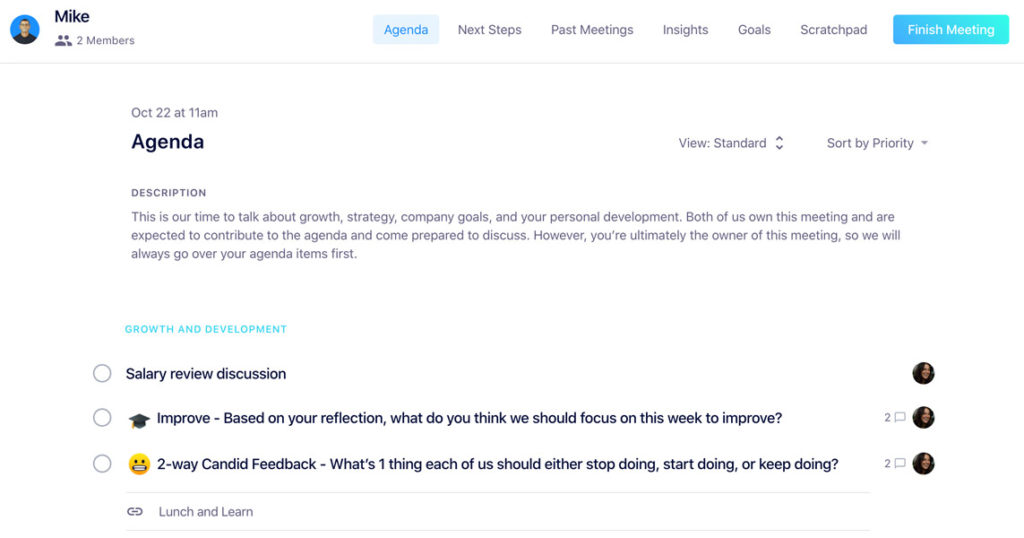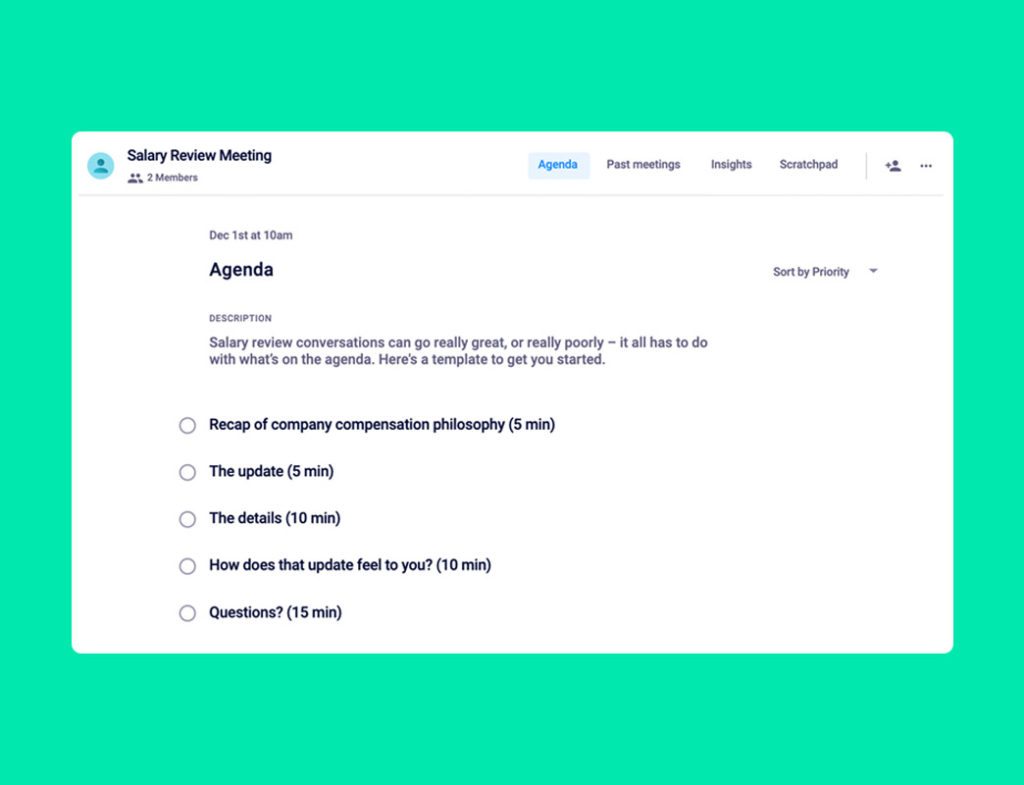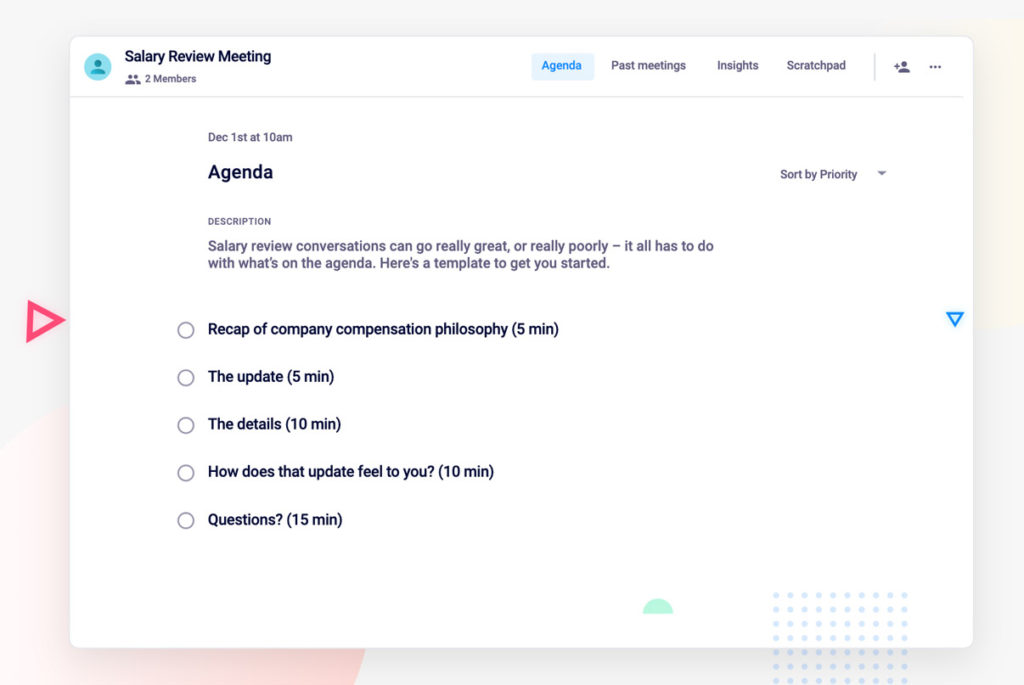Salary review meeting: Agenda, tips, and advice
Salary review conversations can go really great, or really poorly – it all has to do with what’s on the agenda. Here's a template to get you started.
Warning: Undefined array key "category" in /www/hypercontext_216/public/wp-content/themes/Soapbox/hype-files/sections/article/content.php on line 10
Salary review conversations can be really great and a win-win for both the employee and the company. At the same time, they can also be the worst conversation you can have with an employee or your manager.
Employees want to know that they’re not only appreciated but that they’re valued by their manager and company. The same goes for managers; they want to be able to pay their team competitively (or at the very least fairly) in an effort to retain talented employees.
While feelings shouldn’t be a major factor in these conversations, it’s easy for them to seep in, be it excitement, pride, frustration, you name it.
In this article, we’ll cover everything employees and managers need to know when it comes to these sensitive but common conversations:
- How employees can prepare when asking for a salary review or raise
- How managers can prepare for salary review conversations
- Salary review meeting agenda walkthrough
- Salary review meeting agenda template
Let’s dive in!
How employees can prepare when asking for a salary review or raise
Whether you’ve outgrown your role or you’ve done an exceptional job this past year, you think it’s time that you bring up the big salary conversation. For many, this is a really nerve-wracking ask. You know you’re driving results and value for the company, but by asking you’re putting yourself out there.
It’s easy to say, “be confident in yourself”, but that’s easier said than done (trust me, it’s something I struggle with a lot).
So, whether your confidence levels are through the roof or not, here are a few tips to help you prepare for making the ask and doing it successfully.
1. Leave emotions out of it
This is a tough one for many, myself included. But, at the end of the day, you’re working for a business. While you might have incredible relationships with your coworkers and your boss, your salary goes into business-focused calculations like customer acquisition costs, profit, overhead, etc. So, it’s less about how well you get along and more about the value you deliver.
When it comes to salary reviews, it’s less about things like “I feel like I’m doing a great job,” and more about showcasing:
-The results you’ve driven
-What the market values you at vs. your current salary
-The impact you’ve had on the culture and how that affects the business
– MICHAEL ARNONE, CUSTOMER SUCCESS MANAGER AT Hypercontext
2. Do your research
With some quick Googling, you can get a general idea of what someone in your position should be making, from years of experience to overall responsibilities. You can use resources like Payscale, LinkedIn, or even department-specific reports.
Ultimately, you want to give your manager as much information as possible to help them make the decision faster, and have the ammo needed to fight for you if they have to get approval from a superior.
“Preparation is so important. I would go so far as to play out how it could go and anticipate the questions your manager might ask and have prepared materials or case studies to answer them. Go in there as if it’s a first interview and leave no doubt that you’re worth what you’re asking for.”
– MICHAEL MARCUCCI, SENIOR ANALYST AT THE ROSSEAU GROUP
Know your ask
After doing all of that research, you should have a number or an ask in mind to present to your manager. Keep in mind that your ask doesn’t have to strictly be a salary increase, you could ask for an extra week of vacation, title change, stock options or equity, etc.
“Negotiation isn’t a zero sum game. Figure out how you and your organzation can come to a collective agreeement on all areas of your contract, from how you’re compensated to what you’re responsible for.”
– IGOR ILIC, MACHINE LEARNING ENGINEER AT KINAXIS
3. Track and document everything consistently
This is easier to do if your company is consistently setting and tracking company-wide, team, and individual goals. As an individual, it’s important that you’re consistently documenting your wins, impact on the company, and how you’ve tracked against your goals and deliverables.
“Document everything. Learn how to read data so you can argue, with facts, how much you’ve made and/or saved your company.”
– JAMAR RAMOS, COO OF CRUNCHY LINKS
Why is tracking and documenting so important for salary review conversations?
Not only is retroactively looking at your metrics a big-time suck, but you’ll also forget to include a lot of the things you’ve accomplished. Document consistently.
“Track everything. Track monthly, quarterly, and yearly numbers. You should also track your progress on metrics for your role.”
– REBECCA REYNOSO, LEAD EDITOR AT G2
Things you should consider documenting include:
- The work you’ve done: Number of PRs completed, demos booked, blog posts written, average response time to customer tickets, etc
- How that work has impacted the business: Happier customers, growth in acquisition numbers, more deals closed, increased revenue, etc
- Feedback you’ve received: Whether it’s from your manager or a peer, document this positive feedback and present it during your salary review meeting
- Team and individual goals: Document every goal that you’ve been responsible for or contributed to, how you contributed to that goal, and what the end result was (I.e. 100% completed)
“Show your boss the revenue. Every business runs on a single outcome (I.e. revenue). If you can show that your work is directly/indirectly attributable to growing the revenue of the company, it’s easy to negotiate a raise.”
– DEB MUKHERJEE, HEAD OF MARKETING AT DELIGHT CHAT
4. Give your manager a heads up about the conversation
Just as you want to prepare for this conversation, you should allow the same opportunity for your manager. This way, they’re able to come into the meeting prepared to listen and discuss your salary.
Add an item to your shared meeting agenda before your 1:1 that provides some context. It can be as simple as adding an item that says, “Salary review discussion.”

5. Be prepared to have multiple conversations
It’s rare that you’ll get a final answer on your raise or total compensation within the same meeting you make the ask. In many cases, your manager will need to:
- Process the information you’ve shared
- Discuss this with their manager during their next 1:1
- Fit your ask within their existing budget
“It’s important that you start these conversations early and revisit them often so you’re not blindsided or underprepared at half or yearly promotions time.”
– REBECCA REYNOSO, LEAD EDITOR AT G2
So, go in with the expectation that this is going to be an ongoing conversation that could potentially last a month, or even longer. After all, this is a negotiation.
Throughout all of these conversations, it’s important that you take notes on what was discussed and decided during every meeting.
How managers can prepare for salary review conversations
While employees should be the ones driving this conversation when making the ask, it’s important that you also take the time to prepare for this meeting.
1. Understand that this is an emotionally charged conversation
As much as it shouldn’t be an emotionally-driven conversation, it’s still emotionally charged for employees. That’s because you’re ultimately putting a dollar value on someone’s worth.
Going into the conversation, it’s important to understand that there’s a power dynamic. So, you’ll need to ensure that your employee feels comfortable and safe to be open and confident when they’re making their ask. You’ll need to foster a culture of psychological safety from day one.
As you move through this conversation, it’s important to choose your words wisely. Don’t make decisions feel like a personal attack by criticizing your employee’s shortcomings.
2. Set yourself up for success with consistent feedback during 1:1s
The best way to ensure that a direct report comes to this meeting with an accurate understanding of their value is to consistently share feedback during 1:1s. However, feedback shouldn’t only be positive recognition. If it is, your direct report will come into this conversation thinking that they’re an incredible employee with no faults.
But, we’re human and thus fallible. We make mistakes and we’re not perfect, but we don’t have to be.
So, be sure to share recognition and praise, but also to point out areas for improvement. Doing this across every 1:1 will also ensure that, when the time comes for the salary review conversation, you’re on the same page.
3. Understand your company policies and procedures
Do you know your company’s policy and philosophy on compensation reviews? These are important to know, especially if they’re affecting the timeline or overall compensation you’re able to offer.
For example, some companies are strict about when they offer promotions or raises (I.e. only done annually). If you have no control over being able to provide a promotion before that time period, it’s important to know that before you make false promises to your employee.
It’s also important to understand how your company compensates its employees. Do they use a similar database, like Payscale, to benchmark compensation? If so, that’s important to disclose with your direct report.
4. Do your homework
Just as your direct report is expected to come prepared, you should too. Review all of your past meeting notes, performance reviews, and goals to ensure that you’re entering this conversation with all of the information needed to make an unbiased decision.
“A great strategy you can use to help you and your direct report have an honest conversation without damaging your relationship is to print out (or share a doc if you’re remote) past performance reviews, peer reviews, and 360 degree feedback.
When you’re pointing at a paper or a document, specifically when it’s constructive feedback, it makes it easier for your employee to direct their emotions towards an object verus you. This will help keep your relationship in tact, regardless of the outcome.”
– BRENNAN MCEACHRAN, CEO AND CO-FOUNDER OF hypercontext
Other pre-meeting pointers 📝
You get one shot at conversations like this and they are super important to your employees. You owe it to them to put in the time and prepare:
- If you have questions or concerns about how the decision to increase (or not increase) your employee’s compensation was made, then get them answered by your manager or HR team before the meeting. Knowledge is power and if you want to confidently share this update, you need to fully understand how the decision was made.
- Be familiar with your employee’s current salary and any changes they might have gotten before they began reporting to you.
- If you think the conversation is going to be tough, role play it with a peer beforehand. Make some brief bullet points of what you want to share and how you want to share it and practice it out loud with a fellow manager.
No matter what kind of news your sharing, these tips and agenda items will help the conversation go smoothly!
Your salary review meeting agenda template walkthrough

One you’ve got the prep work done, the following five agenda items should help you nail this conversation with your team!
Click here to jump to the Hypercontext salary review meeting agenda template!
1. Recap of company compensation philosophy (5 minutes)
Briefly share some quick reminders of your company’s philosophy around compensation and compensation reviews. For example: “As you know, when we talk about compensation, we’re referring to salary, benefits, stock options etc. It’s easy to get bogged down by the number, so good to remember what’s all included!”
2. The update (5 minutes)
Get to this as quickly as possible. The chances are your employee isn’t absorbing much of the info you share before these words because they’re so preoccupied with this, so share it early in the meeting and leave as much time as possible for discussion and explanation of the decision.
3. The details (5 minutes)
If the person is getting a salary update, share what the change is and what that equates to in actual numbers. (Most people can’t do the quick math on the spot in a potentially stressful situation, so remove that pressure for them!) Once you’ve explained the number, share the context around why that number was chosen. Lastly, make sure to be clear on when this change comes into effect.
If you’re explaining to an employee why they won’t be getting a raise, be sure to give as much context as possible for why this decision was made.
4. How does that update feel to you? (10 minutes)
Pause. Stop talking and let your employee absorb the information you just shared. Give them a chance to reflect and respond.
5. Questions? (15 minutes)
You’ll want to leave plenty of time for your employee to ask questions. Take notes of questions they ask. If they ask for context or additional info that you don’t have on-hand, assign next steps to yourself to follow up.
You should also assign a next step if you promise to go back to HR with a further request for change. Show them you’re taking this seriously, and will be diligent in getting to a place where you both feel comfortable and happy with the outcome.
Other salary review meeting tips 💰
- A looming salary review conversation = a distracted and potentially nervous employee! Minimise the time your team member feels this way and schedule it earlier in the day. Close to or right before lunch is ideal – it gives your employee (and you!) the chance to get take a breather afterward.
- Pick a room that is soundproof and offers privacy – avoid the breakout areas and rooms with huge open windows.
- Make sure to schedule a follow up – especially if there were any questions left unanswered or if you feel like the news wasn’t what your employee was hoping for. Add an item to your next one-on-one agenda that focuses on how they feel about the conversation, and if they have any additional thoughts or questions they want to share.
Your Hypercontext salary review meeting agenda template 👇

Use this agenda template in Hypercontext
What to do next
Now that you've read this article, here are some things you should do:
- I think you will love our library of meeting agenda templates for every type of meeting.
- You should try Spinach to see how it can help you run a high performing org.
- If you found this article helpful, please share it with others on Linkedin or X (Twitter)
